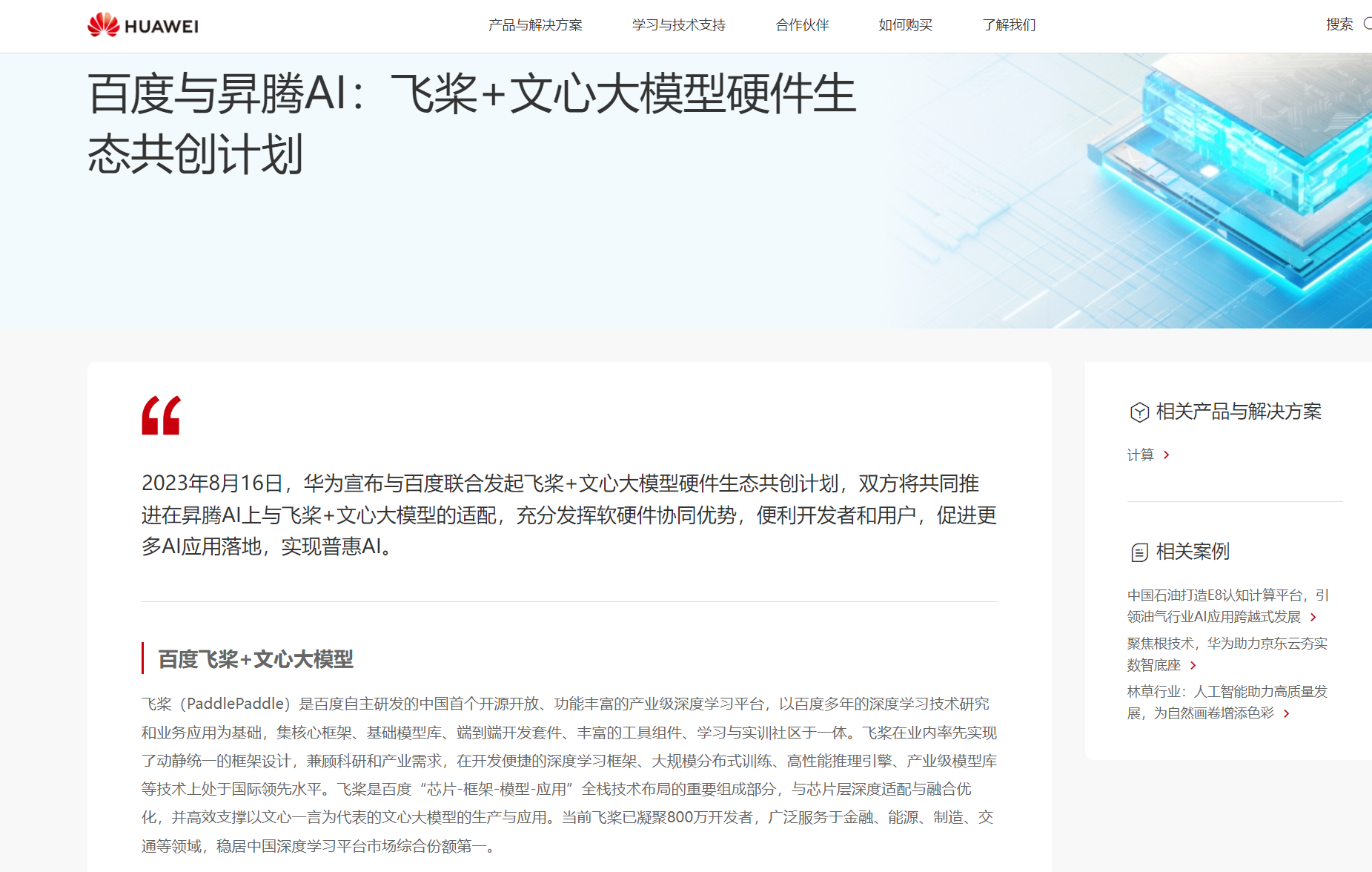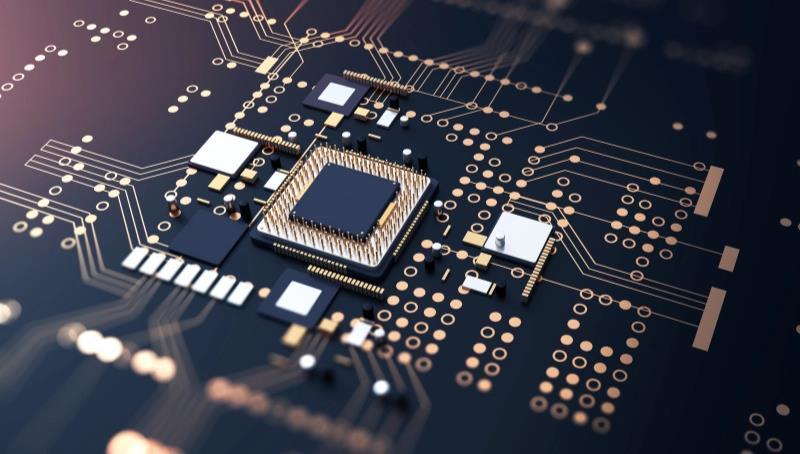China's chip landscape changes! Baidu orders AI chips from Huawei to replace Nvidia
According to reports, in August 2023, Baidu placed an order with Huawei for 1600 Huawei Ascend 910B AI chips to replace NVIDIA chips for its 200 servers.
On November 7th, it was reported that Baidu ordered 1600 Huawei Ascend 910B AI chips for its 200 servers to replace Nvidia chips.
According to insiders, Baidu placed orders with Huawei in August this year, even earlier than the US government's announcement in October of tightening restrictions on chip exports from Chinese companies. Huawei will deliver all chips by the end of this year. As of October, Huawei has delivered over 60% of orders.
What is Huawei Ascend 910B?
It is reported that Huawei's self-developed Huawei Ascend 910B AI chip is used to replace Nvidia's A100 chip.
In 2019, Huawei officially released the Ascend 910 AI chip. Huawei introduced that in terms of computing power, the Ascend 910 fully meets the design specifications, and the power consumption required to achieve the specifications is only 310W, which is lower than the 350W design specifications. At that time, Huawei stated that it had already used the Ascend 910 for actual AI training tasks, and there was a significant improvement in performance during the training process.
Later, Huawei developed the Huawei Ascend 910B, but the specific performance was not disclosed to the outside world. Industry insiders have stated that Huawei is vigorously promoting this chip in the industry, and that its performance should not be on the same level as the previous generation 910.
Although Huawei's Ascension chips are still considered to lag behind Nvidia's chips in terms of performance, Ascension chips are still in a leading position in China. Therefore, some companies have started or deepened cooperation with Huawei in the field of chips, and Baidu is one of them.
In August this year, according to Huawei's website, the two companies jointly launched the hardware ecological co creation plan of PaddlePaddle+Wenxin Big Model. And this order is a concrete example of Huawei and Baidu deepening cooperation.
PaddlePaddle is the first open source, functional and industrial level in-depth learning platform independently developed by Baidu in China; The Wenxin big model is one of the first batch of big models launched by Baidu in China this year, which is the "AI base" of ERNIE Bot.
The cooperation between Huawei and Baidu has a long history. Huawei said that in 2020, it will join the PaddlePaddle hardware ecosystem and reach a deep connection between Shengteng AI and PaddlePaddle. This year, the PaddlePaddle+Wenxin big model hardware ecology co creation plan jointly launched by the two companies will further deepen the cooperation between Huawei and Baidu in the big model field. The two sides said that they would jointly promote the adaptation of Shengteng AI to the PaddlePaddle+Wenxin model, give full play to the advantages of software and hardware synergy, facilitate developers and users, promote more AI applications, and achieve inclusive AI.

Huawei's Ascend 910B has not only been favored by Baidu, but also received praise from iFlytek.
On October 20th, Jiang Tao, the Secretary of the Board and Vice President of iFLYTEK, stated at the third quarter performance briefing that iFLYTEK had already launched a special research and development project with Huawei Ascend earlier this year, working together to create a new base for general artificial intelligence and building domestic large model architectures on the basis of independent innovation in software and hardware. Jiang Tao also stated that the current Huawei Ascend 910B capability has basically achieved benchmarking against the NVIDIA A100. Through cooperation with Huawei, iFlytek will continue to promote the research and application of artificial intelligence technology, providing the industry with more efficient, secure, and intelligent solutions.
Opportunities for Huawei
According to insiders, the total value of this order between Baidu and Huawei is about 450 million yuan, equivalent to approximately 61.83 million US dollars. Although compared to the thousands of chips previously ordered from Nvidia, the size of this order is relatively small. But the significance behind it is extraordinary. Sources say this indicates that some domestic technology companies in China may gradually abandon Nvidia and turn to domestic chips.
Chinese technology companies such as Baidu, Tencent, and Alibaba have always been long-term customers of Nvidia. Although many of these companies are developing their own chips, such as Baidu's self-developed cloud full function AI chip - Kunlun, these technology companies mainly use Nvidia's A100 chip to train their Large Language Model (LLM).
Last year, Nvidia launched a "low-end version" of its chips, A800 and H800, specifically designed for Chinese companies, after its A100 and H100 chip exports were restricted. But with export restrictions further tightening in October this year, Nvidia is unable to continue selling A800 and H800 to Chinese companies.
In this situation, Chinese companies have to turn to other chip suppliers, especially domestic suppliers, in order to avoid the risk of chip supply interruption as much as possible in order not to slow down AI related project research and development.
The source said, "They ordered 910B chips in response to the possibility that they may no longer be able to purchase chips from Nvidia in the future."
After the tightening of restrictions in the United States in October, some analysts predicted that the US chip export restrictions would create opportunities for Huawei to expand in the domestic chip market in China. According to estimates, the domestic chip market in China is approximately 7 billion US dollars.

Although chip export restrictions have created opportunities for Huawei, it also requires Huawei's own technology to be "strong enough" to attract companies to place orders. Coincidentally, Huawei's progress in the chip field in the past two years is evident to the outside world.
In August of this year, Huawei suddenly launched the Mate 60 series smartphones, which attracted widespread global attention. The renowned semiconductor industry observer TechInsights discovered after dismantling the Huawei Mate 60 Pro that the phone uses the Kirin 9000 chip produced by SMIC's 7nm (N+2) foundry process. "This indicates that the Chinese semiconductor industry can make technological progress even without EUV lithography tools. The difficulty of this achievement also reflects the resilience of China's chip technology capabilities," said Dan Hutcheson, Vice Chairman of TechInsights.
In September, there were reports that Huawei's subsidiary Hisilicon Semiconductor began shipping newly developed surveillance camera chips to customers this year, which was seen by the outside world as another sign of Huawei's comeback.
Before the introduction of chip export controls in the United States, HiSilicon Semiconductor was a major chip supplier in the surveillance camera industry. According to Southwest Securities, the company had a global market share of up to 60% in 2018. But after the introduction of relevant chip restrictions, the company's market share plummeted. According to consulting firm Frost&Sullivan, by 2021, HiSilicon Semiconductor's global market share was only 3.9%.
·Original
Disclaimer: The views in this article are from the original Creator and do not represent the views or position of Hawk Insight. The content of the article is for reference, communication and learning only, and does not constitute investment advice. If it involves copyright issues, please contact us for deletion.